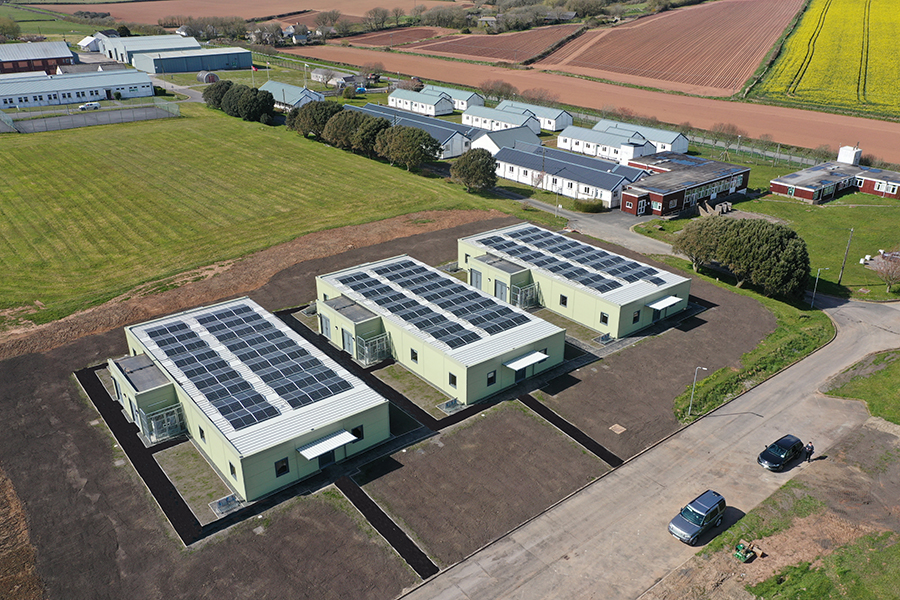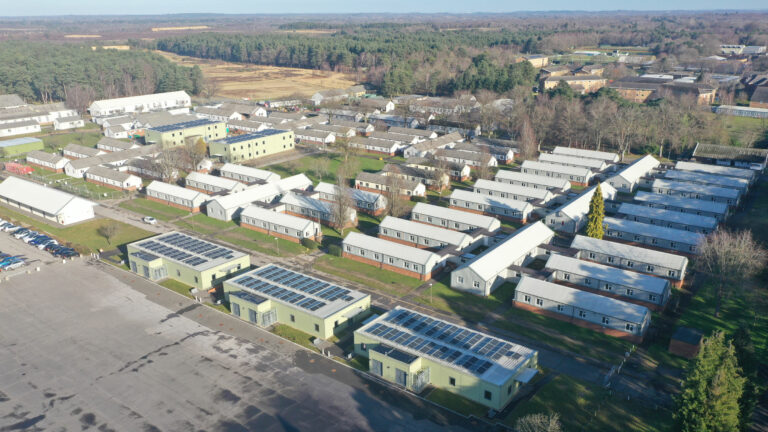Landmarc, the Defence Infrastructure Organisation (DIO) and modular construction specialists Reds10 have been named as one of four finalists in the ‘Positive Climate Action’ category at this year’s prestigious Institute of Workplace and Facilities Management (IWFM) Impact Awards, for the delivery of the Net-Zero Carbon Accommodation Programme (NetCAP).

Pictured above: an aerial view of the net-zero carbon buildings at Castlemartin. Photo credit: Reds10.
NetCAP is a government and army funded programme that is transforming the lived experience for troops using the Ministry of Defence (MOD)’s UK Defence Training Estate. It is set to deliver over 75 new carbon-negative accommodation blocks and other training facilities across eight camps, providing more than 3,900 bed spaces.
Phase one of the programme began in January 2020. In just 18 months, five military training camps were upgraded using Modern Methods of Construction (MMC) to deliver 45 modern, carbon-efficient, accommodation facilities, with more than 2,000 bed spaces. This success led to additional investment that will see another 29 builds delivered in financial year 22/23.
The programme is largely replacing very old pre-World War Two, inefficient timber and Nissen style buildings, with modular blocks that provide around 46 bed-spaces each, with showers, ablutions and drying rooms in one modern complex. Each building can also be sub-divided as necessary, meaning that different military units, whether trained soldiers or cadets, male or female, can be accommodated within each block together.
So far NetCAP has achieved:
- The DTE’s first carbon negative accommodation
- A significant reduction in embodied carbon by some 130 tCO2s per building, saving 9,100 tonnes of carbon across the current programme, by monitoring user behaviour and lessons learned to optimise the building design
- Considerable savings in time spent on manufacture and installation from 15 weeks for the programme prototype to less than 13 weeks for subsequent buildings, minimising any impact on training soldiers during the construction phase
Peter Nicol, Landmarc Programme Director, said, “NetCAP has been and continues to be a significant investment, which is supporting the Ministry of Defence with its long-term carbon reduction goals. The accommodation is modern, smart and carbon-negative and is completely transforming the Training Estate, making it a more sustainable place to live, work and train for our Armed Forces.
“It is an honour to be recognised as a finalist in these awards alongside some of the best organisations in our industry.”
Paul Ruddick, Chairman at Reds 10 added, “It is amazing to see the continuous success and recognition that NetCAP is receiving. Thanks to the Army’s commitment and our work alongside Landmarc and DIO, the programme sets a new standard for Public Sector construction projects. It speaks directly to the government’s net zero, Project Speed and the Construction Playbook agendas, while fundamentally transforming the lived experience of our armed forces personnel.”
Brigadier Jonathan Bartholomew, DIO’s Head of Overseas and Training Region, said, “Comfortable, modern accommodation can make a real difference to the wellbeing of personnel on exercise, and in turn to how they perform during training, so this programme is a priority for us. We are committed to delivering NetCAP in order to deliver 3,900 bedspaces in net carbon zero buildings, and thereby transforming 10% of UK DTE accommodation from a pre-WWII character into modern buildings delivering on the demand for an improved lived experience, reduced running costs and contributing to carbon zero.”
The IWFM Impact Awards is the workplace and facilities management industry’s most prestigious event; it celebrates and showcases outstanding best practice and ingenuity from an influential profession which touches many areas of life, including some of the greatest challenges facing economies and communities across the globe. The winners of all categories will be announced at a ceremony on Monday 17 October at the JW Marriott Grosvenor House London.




